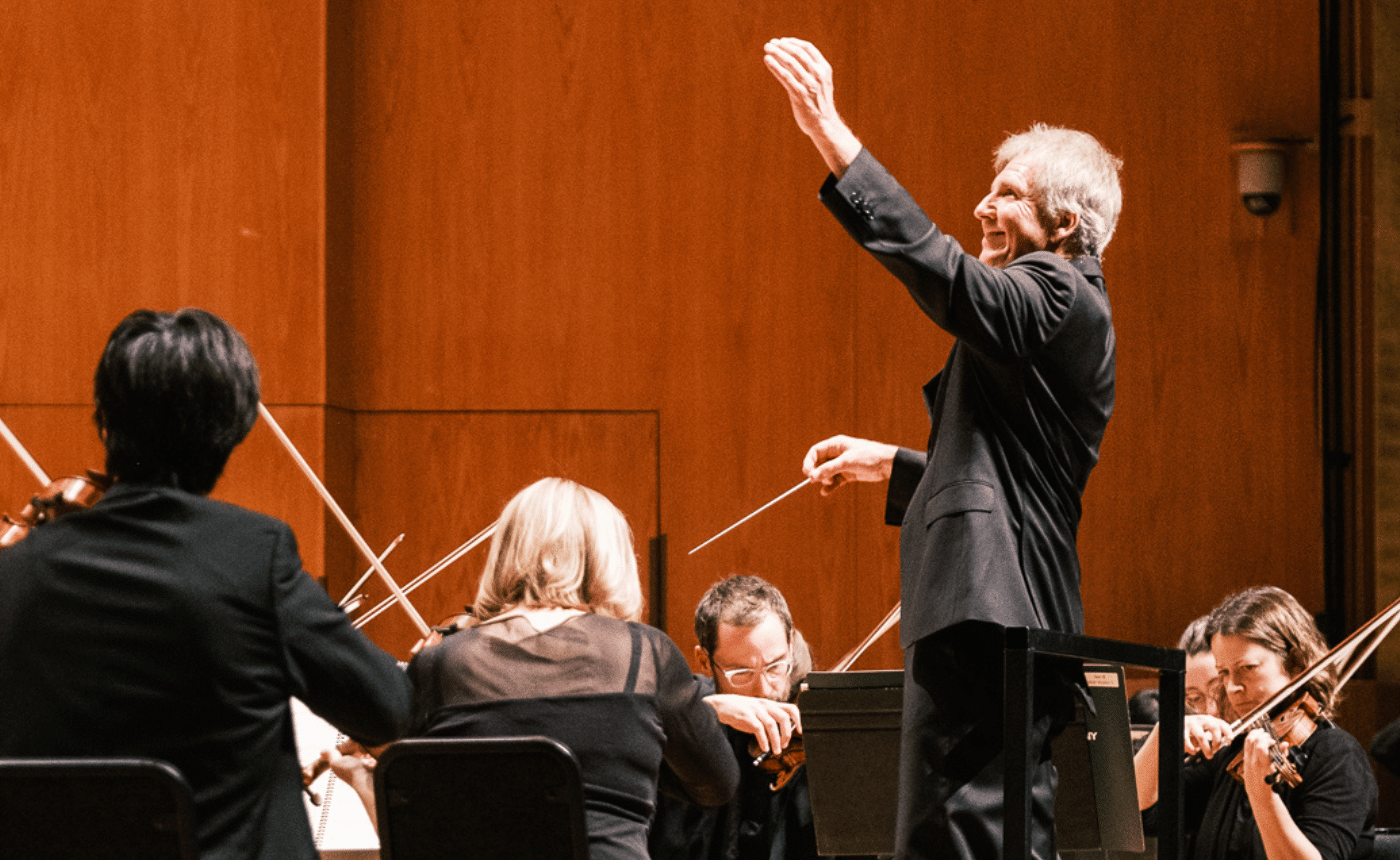Mahler Memories: Craig Fineshriber
 Craig Fineshriber (Principal Percussion and Librarian, 1971-1994; Principal Percussion, 1971-2011)
Craig Fineshriber (Principal Percussion and Librarian, 1971-1994; Principal Percussion, 1971-2011)
First Experiences
When you’re only sixteen, and Abravanel was conducting the orchestra, there are several things that happen. One of them is you are just scared to death. And secondly, you really do view him as a gigantic personage. Almost godlike. I had never had an encounter with a musician anywhere near his experience. I mean he was a protégé of Bruno Walter and Kurt Weill. He knew Otto Klemperer, and he knew Stravinsky. And that was amazing to a sixteen-year-old kid. I graduated from high school in ’64, and that fall I played my first concert with the Utah Symphony. And that’s when we recorded the Mahler Seventh—that fall. That was also my first experience with Mahler.
Peculiar Sounds of Mahler in the Percussion Section
Alma Mahler—his wife—said, “You’ve written a percussion concerto, not a symphony” because Mahler had all these weird instruments. He had cowbells, and he had big bells. As a matter of fact, Mahler uses huge bells in the finale of the Second Symphony, and he used to take them with him. He would have them shipped where he would go to guest conduct the Second Symphony because they were so important to him. Later on, when he started writing for cowbells, he would carry those around with him, too, because he was very specific about what he wanted in terms of that sound. And then there was the rute, which is a bundle of sticks you smack against the rim of the bass drum—that was a new effect. It’s a great sound. So, he came up with that. And then there are the huge hammer blows in the Sixth Symphony—three of them. And that, of course, was a scandal when he first premiered that sound effect. I’m currently reading a biography of Mahler in four volumes by French musicologist Henry-Louis de la Grange, and enjoy imagining those times.
Contrasts in Mahler’s Life and Music
Mahler was incredibly well read in philosophy, in science, and music history. That’s what he would do in his spare time, although he would set aside a little time each day to spend with his children. That’s one of the essentials about Mahler: there are stretches of folk song or what seem like children’s songs, and then he alternates that with incredible depth and profundity. In the early days, when reviewers started hearing Mahler symphonies, that’s one of the things they criticized him for. But by the Twentieth Century, that’s one of the things that made everybody say, “The man was a genius!” because that is more what living life is like. Every day you have experiences like that. You spend the morning playing with the kids, you know, playing “Life” or something like that with the kids, and then that afternoon you are immersing yourself in some heavy reading or you’re going to rehearsal, or something like that. It’s just back and forth like that.
Mahler Conducts
Mahler did reach the point in his career where he insisted on conducting the premieres of his works because he had a couple of occasions where someone else had conducted one of his symphonies and it fell flat on its face. So at that point he decided, “Okay, anytime there is a premiere, I have to go conduct it or you can’t can’t play it.”
Bruno Walter
Abravanel knew Bruno Walter. As a matter of fact, when Abravanel got the job here in 1947, he called Bruno Walter to tell him, “Hey, I got an orchestra. I got my own orchestra.” And Bruno Walter said, “Yeah, where is that?” And he said, “Well, it’s in Utah.” And Bruno Walter said, “What are you doing out there? You don’t want to be out there. You’re never going to make a name for yourself out there.”
The Clarinetist Who Will Remain Nameless
I think it was in the Mahler Fifth Symphony (and this happens in several of the Mahler symphonies) where certain wind or brass instruments were asked to raise their bells so that the sound will go out more. The German phrase is “Schalltrichter in die Höhe.” It would be stronger, it would be louder, it would be more strident. And in one case during the 5th, it was the clarinets who were supposed to do it. One of the clarinetists—who will remain nameless—refused to do it. The musicians often refuse to do it because they say, “Oh, if we do that we can’t read the music.” So the clarinetist refused to do it. We went through it a couple times and Abravanel noticed that this clarinetist wasn’t doing it. And finally he slammed his hand down on the podium and he said, “It says in the score ‘Schalltrichter in die Höhe!’” It was so frightening that all of the sudden everybody was doing it. Mahler, in his scores, is very, very particular and very detailed about what he wants. So if he wants your bells up, you put your bells up, period. And Abravanel would insist on that.
Single-mindedness
There were people in Abravanel’s orchestra who didn’t like him because he was so single-minded. I remember when one of my children was born, I was there for the birth but then I had to go back to the rehearsal because there was no such thing as time off, even if your baby was born. That’s the way it was. And Gustav Mahler was that way too. So single-minded in purpose that nothing was more important than what you were doing at the moment. Nothing! And nothing was more important than the music.
Becoming a Better Human Being
We were rehearsing a Bruckner symphony and it wasn’t going well, so Abravanel stopped and he said, “Look, you know, we need to work harder on this part. Now when you go to do your practicing, work on this. Let’s make it beautiful.” And he said, “Not because you are musicians, but because you are human beings.” And that’s the way he looked at it. Being a great musician or being a great anything makes you a better human being, and that’s what it’s about. That’s what art is about. That’s what high art is about. It’s to make you a better human being.
Mahler Tells the Story of Life
We were on a trip this summer with Scott Kenney and his wife Susan. At one point, Susan said, “Craig, if you had one symphony that you could take with you to a desert island, what one would it be?” And I thought, and I thought, and I thought. And I said, “You know, I’ve narrowed it down to three, but I think I’d say I want a recording of the Mahler Ninth.” And Scott said, “That’s what I’d take.” I mean, I just think that’s amazing that out of all the things it could possibly have been, here are two people who had played with Abravanel, who were introduced to the tradition and so forth. So Susan said, “Well, why would you do that?” And I said because I think for me as I listen to Mahler symphonies from one through nine and Das Lied, that I’m watching life unfold from the time that you’re a young innocent in nature in the introduction of the First Symphony and the cuckoos and all that kind of stuff, all the way to the Ninth Symphony. It’s about death, especially the last movement. It’s in the last movement where Mahler tells you what it’s like to die. And so I said, “To me, that’s why I would like Mahler Ninth, because that tells the story of not just my life, but it tells the story of everybody’s life.” And that’s why I think he’s just such a great, great composer.












